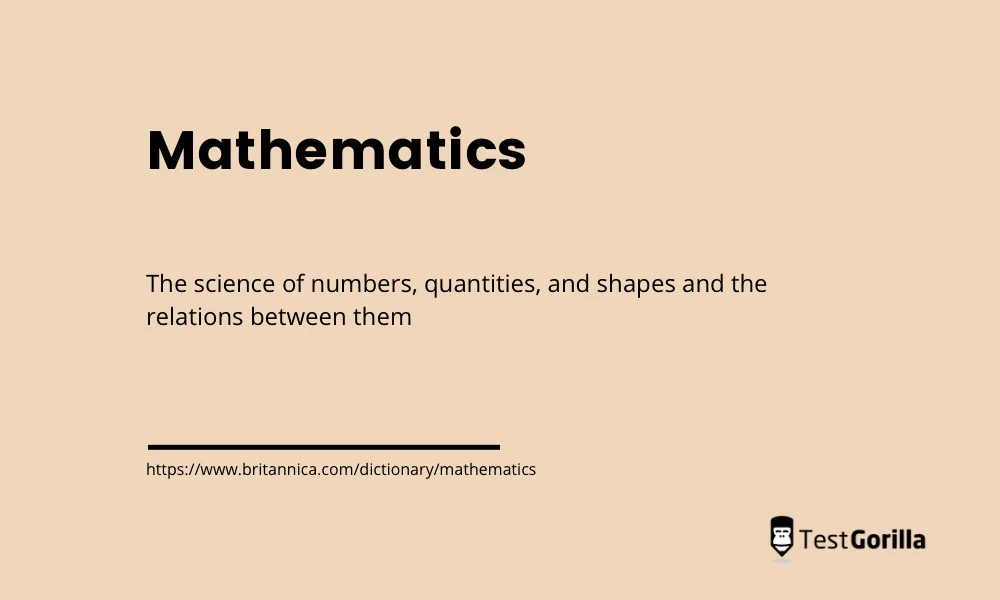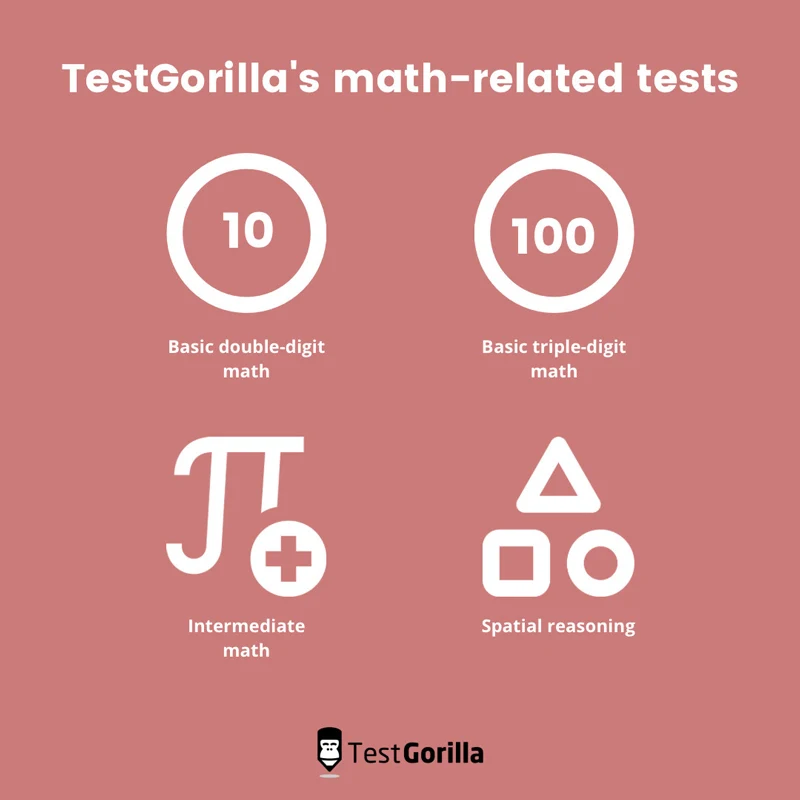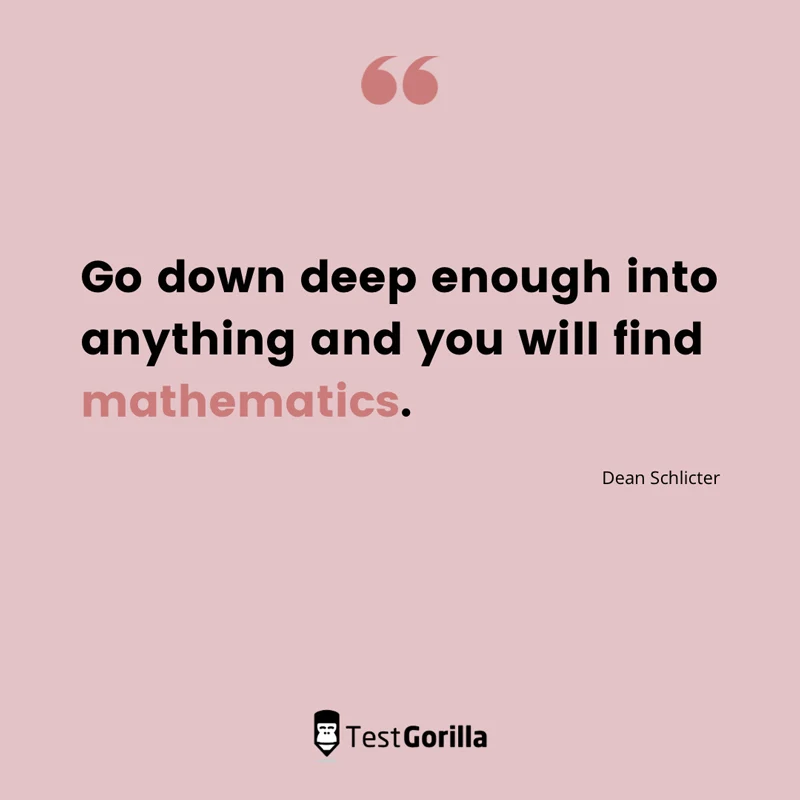Math skills are essential for many jobs, even entry-level positions, such as cashier and shop assistant. In short, any role that calls for money handling or calculations requires basic math and numeracy skills.
For those who aspire to a career in one of the STEM subjects (science, technology, engineering, and math), more intermediate and advanced math skills are needed to succeed in these areas.
However, it appears that math is the one skill that many Americans dislike and try to avoid throughout their lives. Scientific research done on what is called “math anxiety” shows that a startling 93% of Americans state they experience some level of math anxiety.
In this article we’re going to look at why math is crucial, the huge math skills gap, job roles that require intermediate math, and how to use an intermediate math skill test as part of a broader pre-employment skills assessment.
First, let’s take a look at why math and numeracy skills are so important in the job market, and the growing skills gap for jobs that require intermediate math skills.
Table of contents
The alarming state of math skills in America
With an estimated 3.5 million STEM jobs needing to be filled by 2025 in America, there is a concerning skills gap that is growing ever wider, and the lack of math skills is contributing to it. The National Assessment of Educational Progress (NAEP) shows that in 2019 only 24% of twelfth-graders were proficient in math. NAEP judges the meaning of “proficient” as a “B” grade.
Surprisingly, given the abysmal state of math skills in the US, many employment websites (such as Glassdoor) advise candidates not to list things like “basic math skills” on their CVs/resumes, as they state that they “are not differentiators – they are expected.”
They may be expected, but as the statistics show, the reality is very different. How do you know for sure your candidates have math skills if they are not even expected to put them on their CVs? This is one of the many ways in which CVs set both candidates and employers up for failure.
The answer is simple – have your candidates take a pre-employment math test.
TestGorilla’s Intermediate math test will ensure your candidates are competent in intermediate math before you get to the interview stage. Later, we’ll take a closer look at the intermediate math skill test and how it can be used as part of a wider skills assessment to empower you with the knowledge to make informed hiring decisions.
In the meantime, let’s focus on job roles that require intermediate math skills.
Job roles for those with intermediate math skills
There are many jobs available for those who enjoy working with numbers. We’ve tried to include a diverse range of roles that require intermediate math skills.
1. Accountant/Bookkeeper
Yes, this is perhaps the most obvious one for the number-lovers. Accountants and bookkeepers are responsible for preparing and examining accounting records, financial statements or financial reports.
They must also be highly detail-oriented in order to spot errors and conform to accounting standards. Accuracy is crucial for accounting professionals, and math skills are needed to calculate taxes, manage budgets, and keep financial records straight and up to date.
2. Healthcare professional
Doctors, nurses, pharmacists, and other healthcare professionals need math skills as well as clinical ones. Doctors, nurses, and pharmacists use math to calculate the correct dosage of medication when they write prescriptions or administer medications, and it’s crucial that they do so accurately or there could be life-threatening consequences.
Medical professionals also use math when drawing up statistical graphs of epidemics or success rates of treatments. Those involved with medical billing must also use their math skills to accurately calculate medical costs so that patients aren’t paying too much or too little for their treatment.
3. Computer programmer/developer
Computer programmers and developers write and test code for applications and software programs. Through their use of programming languages like Java, Python, Laravel or C++, they are able to write, debug, and update programs effectively.
Programming requires math skills to solve problems, as well as to evaluate and analyze data. Other skills programmers need include critical thinking, teamwork, and communication.
4. Supply chain manager
Supply chain managers (also known as logistics managers), are responsible for the smooth running of the supply chain that links products, consumers and companies together.
Another part of their job is to limit costs and improve efficiency while also keeping distribution employees safe.
Because supply chain managers need to hold complicated metrics, routes, staffing levels, and locations in their minds while they make decisions, they must have a good grasp of math and calculation.
Other essential skills for this role include attention to detail, problem solving, communication, and management skills.
5. Technical writer
Technical writing is a highly specialized writing skill that requires a good understanding of math.
Technical writers are involved with the designing, writing, and maintenance of technical documentation. Math skills are increasingly important for technical writing in specialized areas such as mathematics, engineering, or business.
Technical writers also work for the government and write the official material for many of their pamphlets. These cover different fields, including the activities of various government agencies and research development in such areas as medicine, education, agriculture, and aerospace.
Technical writers must also be detail-oriented as well as be able to communicate effectively.
6. Loan officer
A loan officer is usually involved with mortgages, but often deals with business loans too. They work for a bank or financial institution and help clients find suitable loans or mortgages.
Math is an important skill in this role, as loan officers are responsible for collecting and analyzing loan applicants’ financial information, and they must be able to work out if the prospective borrowers can afford to pay the loan back. This involves looking at their income and outgoings and calculating affordability.
7. Bank clerk/teller
Although considered an entry-level position, bank clerks need a strong grasp of intermediate math to succeed in the role.
Bank clerks deal with customer transactions, as well as maintaining financial and customer records. Many bank clerks also work in specific departments as loan or credit clerks. Those who work in these roles search for and verify customer information as part of the loan application process, supporting loan officers by providing financial data to help them make a decision.
Bank clerks must be meticulous in their work and able to spot errors and inconsistencies in financial calculations.
8. Building trades
Tradespeople like plumbers, electricians, mechanics, and carpenters may seem a little out of place on this job list for math skills, but they use math everyday.
Tradespeople in these roles use math for taking accurate measurements, calculating how much material they need to buy, and estimating how much a job will cost.
They also need to be able to calculate angles and distances, and in the case of electricians, they must know how to calculate currents and voltages in order to do their job safely.
9. Animator
Animation maybe doesn’t seem like it has much to do with math, but it plays a role in creating animations. Gone are the days of animators drawing frame after frame by hand; most modern animation is computer-based.
An animator nowadays requires strong math skills to make their animations. Because animators deal with objects that constantly move and change, it is important that they understand geometric figures and they often need to use linear algebra for the process of creating movement in their animations.
10. Product designer
Although product design draws heavily on creativity, math also plays a huge part. Visualization is a crucial skill for a designer, and math skills are necessary to create credible visual explanations using computer programs.
Designers also need to use math to keep their spacing and sizing consistent, and be able to work comfortably with percentages. Product design is where art, math, and even engineering come together in order to create something that is both efficient and beautiful at the same time.
Other skills needed for a product designer include design thinking. This is a process that can be utilized in the design of just about anything, using a solution-based approach to problem solving.
How to use an intermediate math skill test effectively
In this section, we’re going to look at how you can use our Intermediate math skill test to inform and empower your hiring strategy.
At TestGorilla, we’re all about skills-based hiring. Too many great candidates get overlooked for positions because they may have long gaps in their CV, or they don’t have a relevant qualification.
But, does any of that really matter if they prove they have the job-related and soft skills needed in a pre-employment test? Indeed, candidates may also possess useful hidden talents that don’t show up on their resumes.
When you look at it that way, you realize that a CV or resume is just a list of a candidate’s past experience and education. It has no bearing on their actual job skills, and it isn’t a good predictor of future job success either.
Our skills tests are created by subject-matter experts, and the results provide you with solid proof that those who score highly on them have the right skills for the job. You can even add custom questions to our tests so you can ask questions specifically related to your particular open role.
TestGorilla’s intermediate math test evaluates candidates’ ability to solve mathematical equations using triple-digit numbers. The test helps you identify candidates who can solve equations using addition, subtraction, multiplication, and division.
For the best results, the intermediate math test isn’t taken as a standalone test, but as part of a larger pre-employment skills assessment that should be taken at the start of the hiring process.
Create an assessment around the Intermediate math test
Employees need a variety of skills to excel at their role. For example, someone could pass the Intermediate math skill test with flying colors, but have terrible time management skills or a personality that doesn’t fit well with the job.
To increase the chance of you making a great hire we recommend using the Intermediate math test as part of an assessment. TestGorilla’s assessments consist of up to five individual skills tests, which are taken in one sitting by the candidates.
For instance, you could include the Intermediate math test, and add four other relevant tests to create an in-depth assessment. The tests you add will depend on the specific job role you are hiring for, but there should be a good mix of job-related, personality/culture, or cognitive ability tests, which you can see in our test library.
A range of tests will give you a deeper insight into candidates, and will help shape your interview questions.
For an in-depth look at the best way to build a skills assessment, you might like to read our comprehensive guide to creating an assessment.
Many employers have found that skills-based hiring has cut their time-to-hire, as well as providing a fair and unbiased way of evaluating candidates. If you are still unsure how assessments can help your organization, why not take a look at how skills assessments helped MedX improve the quality of their hires?
Join the skills-based hiring revolution with TestGorilla
We hope you found our article about job roles for those with intermediate math skills helpful, and that it gave you insight into how you can create a skills-based assessment using the intermediate math skills test.
Math is a vital skill for many jobs, but it’s hard to evaluate math skills from a CV. Our intermediate and basic math skills tests gives you hard data about the candidates’ math abilities right at the start of the hiring process, which means you don’t need to waste time interviewing candidates who don’t possess the necessary math skills.
Sign up for a free account with TestGorilla and start building your assessment around our intermediate math test, or check out our pricing page to find the plan that works best for you.
Have questions and want to know more? Book a free live 30-minute demo with our sales team, who will be happy to answer any queries you have.
Related posts
Hire the best candidates with TestGorilla
Create pre-employment assessments in minutes to screen candidates, save time, and hire the best talent.
Latest posts
The best advice in pre-employment testing, in your inbox.
No spam. Unsubscribe at any time.

Hire the best. No bias. No stress.
Our screening tests identify the best candidates and make your hiring decisions faster, easier, and bias-free.
Free resources
This checklist covers key features you should look for when choosing a skills testing platform
This resource will help you develop an onboarding checklist for new hires.
How to assess your candidates' attention to detail.
Learn how to get human resources certified through HRCI or SHRM.
Learn how you can improve the level of talent at your company.
Learn how CapitalT reduced hiring bias with online skills assessments.
Learn how to make the resume process more efficient and more effective.
Improve your hiring strategy with these 7 critical recruitment metrics.
Learn how Sukhi decreased time spent reviewing resumes by 83%!
Hire more efficiently with these hacks that 99% of recruiters aren't using.
Make a business case for diversity and inclusion initiatives with this data.




















